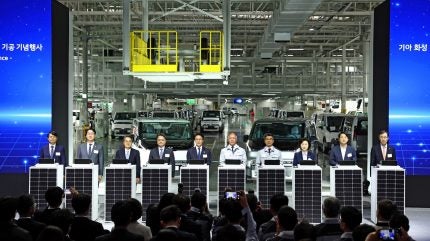
Kia Corporation celebrated the official completion of its dedicated Platform Beyond Vehicle (PBV) production facility in South Korea, the AutoLand Hwaseong EVO Plant East, as the automaker continues to expand its presence in the global battery electric vehicle (BEV) segment. The company also broke ground on a second BEV plant nearby, the AutoLand Hwaseong Plant West.
The EVO Plant East actually began production earlier this year, making the PV5 battery-powered light van and minibus, which has a modular design allowing for different body types to be readily produced on the same platform. The facility has a production capacity of 100,000 units per year.

Discover B2B Marketing That Performs
Combine business intelligence and editorial excellence to reach engaged professionals across 36 leading media platforms.
The company also began construction of the AutoLand Hwaseong EVO Plant East in November, which is scheduled to be completed in 2027 with a production capacity of 150,000 units per year. It will produce the larger, battery-powered PV7 vans and minibuses. Together, the two plants will have a combined production capacity of 250,000 units per year, forming “a strategic hub” for the automaker’s global PBV business.
The opening ceremony was attended by South Korea’s Prime Minister, Min-seok Kim, who said in his congratulatory remarks: “I am delighted to take part in the completion ceremony for Kia’s Hwaseong EVO Plant East and the groundbreaking ceremony for EVO Plant West. We will usher in a new era of innovation in future mobility together with the automotive industry, embracing new challenges including electrification, autonomous driving, and AI.”
Kia President and CEO, Ho Sung Song, said in a statement: “Kia is leveraging the electrification of light commercial vehicles as a key opportunity to position PBVs as a core future business. As we continue our journey toward sustainable future mobility, Kia remains committed to becoming a trusted partner in building a better future for Korea — and for humanity as a whole.”
Smart factory
Kia pointed out that the AutoLand Hwaseong EVO Plant East “applies a wide range of future-oriented manufacturing technologies and is designed to minimize its carbon footprint. The facility emphasizes automation, sustainability, and a human-centric environment, with each process integrating features that reflect these priorities.”
The company confirmed the plant will apply Hyundai Motor and Kia’s ‘E-Forest’ smart factory brand to enable real-time operation and quality control. The bodyshop uses a smart logistics system including automated guided vehicles (AGVs) and other advanced technologies. The paint shop operates dry booths that reduce the impact of controlled substances, making it a “low-carbon sustainable facility.”
In the final assembly shop, Kia said it has created a human-centric environment based on advanced automation technologies. The facility features specification guidance monitors to prevent operational problems, automation of labor-intensive processes such as heavy component installation, and low-noise equipment contributing to a human-centric environment.
A flexible production process has been adopted by combining Kia’s mass-production conveyor system with a cell-based production process, which enables simultaneous manufacturing of different mobility types.






